'Very violent': How Italy’s youngest mafia is terrorising the Puglia region
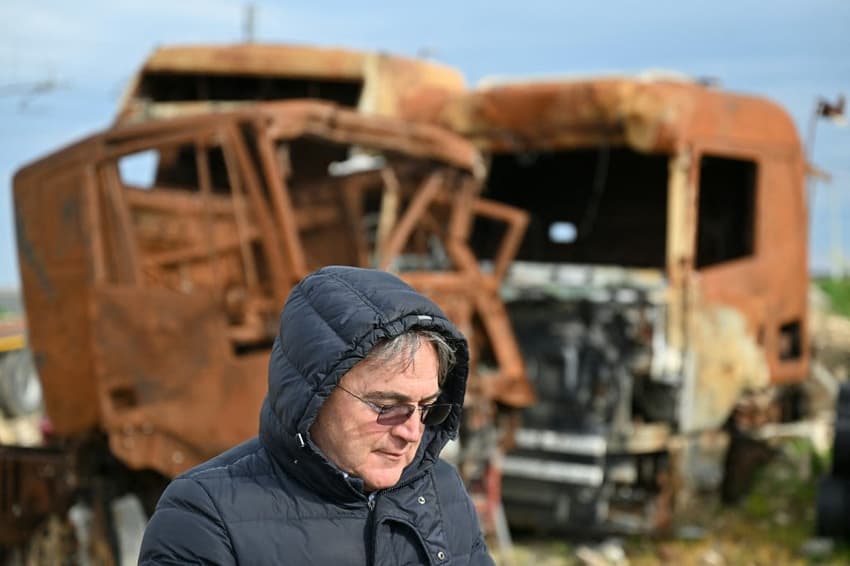
SPECIAL REPORT: The Italian state is finally paying attention to a “fourth mafia” operating in the southern Puglia region, and experts say it's the country's youngest, least evolved, and most violent crime syndicate of all.
It took a loaded pistol pointed at Lazzaro D'Auria's head for the Italian landowner to finally say yes to the demands of the country's newest and most violent mafia.
The Puglia farmer had resisted their extortion attempts in the past; threats, fires, and damage to his crops and property.
But an early morning visit from a dozen men, including a boss with a gun, forced him to agree to their demand for 150,000 euros a year.
Instead of paying up the next day, D'Auria went to the police, making him one of the few people to ever denounce Foggia's little-known and long-ignored mafia known for its extreme violence.
"If more citizens pressed charges, the local mafia could be weakened," D'Auria, who has lived under police protection since 2017, told AFP.
READ ALSO: ‘We don’t talk much here’: Silence grips Sicilian mafia boss hometown
"Citizens, speak out!" implored the 57-year-old, who sees recent crackdowns by authorities as a sign the mafia can be weakened if locals overcome their fears
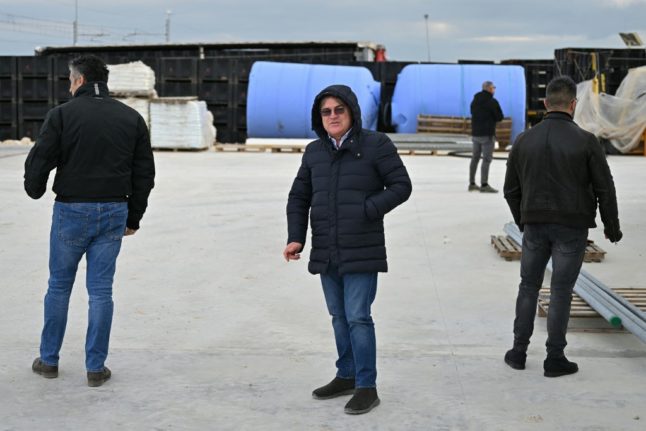
Farmer Lazzaro D'Auria being escorted by police in the province of Foggia. (Photo by Alberto PIZZOLI / AFP)
Its bloody clan wars were once dismissed as farmers' feuds, but the local mafia operating in the northern part of the Puglia region is finally setting off alarm bells inside the Italian state.
It is sometimes referred to as the ‘Fourth Mafia’ - after Sicily's Cosa Nostra, Calabria's 'Ndrangheta and Naples' Camorra.
But interest in its activities has come late, as Italy's youngest mafia already has a stranglehold over the province.
"It's a rudimentary, primitive mafia. Very violent, very aggressive," said Ludovico Vaccaro, Foggia's public prosecutor.
While the other main mafias have graduated to less visible, more profitable activities, including infiltrating the legitimate economy, the Foggia mafia is still in a nascent phase.
READ ALSO: Messina Denaro: Captured boss’s cousin speaks out against ‘mafia culture’
"Today the mafias have evolved, so they shoot less, seeking a strategy of silence to stay unnoticed," Vaccaro said.
"Whereas this is still a mafia that, to show its power over the territory, shoots and kills."
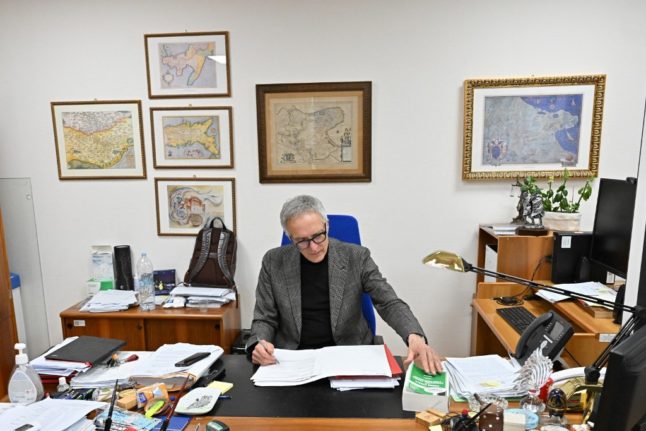
Foggia Public Prosecutor, Ludovico Vaccaro pictured at his office in Foggia. (Photo by Alberto PIZZOLI / AFP)
The ‘Foggia mafia’ is a catch-all label for a syndicate comprising different groups.
The province of Foggia has Italy's third-highest homicide rate, and five of the 16 murders last year were mafia-related.
Family-based ‘battalions’ from different areas often cooperate, dividing extortion money that pays associates and prisoners.
When conflicts sometimes arise over the division of the illicit proceeds, there are quarrels and the battalions clash and start killing each other," said deputy police chief Mario Grassia.
Each group has its speciality, from military-style armed robberies of freight trucks in Cerignola to the old-school tactics used in the city of Foggia, where nighttime bombings of storefronts and cars persuade hesitating shopkeepers to pay up.
Farmers in San Severo like D'Auria often find their olive trees felled, their harvests torched or tractors or livestock stolen.
In Gargano, whose spectacular coast welcomes tourists as well as Albanian drug shipments, the mafia is particularly violent.
The Gargano mafia's grisly calling card, authorities say, is shooting victims in the face, or dumping them in caves.
READ ALSO: PROFILE: Ruthless Sicilian mafia boss Messina Denaro’s reign of terror
"It's easy to hide things. Every once in a while we find something serious, stolen cars, bodies of missing people," prosecutor Vaccaro said.
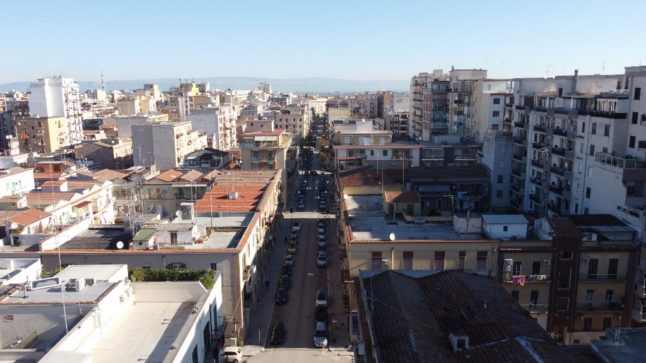
An aerial photo of the city of Foggia, southern Italy. (Photo by Giovanni GREZZI / AFP)
During a recent drive with police through the city of Foggia, AFP saw countless reminders of the bloodshed that has terrorised the population for decades.
"Right now there's no mafia war, but there's a settling of accounts," said a detective who requested anonymity.
Deputy chief Grassia said he was particularly concerned by three of last year's murders being committed by minors.
"Those participating in these gangs have kinship ties with subjects linked to organised crime," he said.
The newest danger posed by the mafia is infiltrating public institutions. Foggia's city council was dissolved in 2021 due to mafia infiltration and its mayor arrested on corruption charges, one of five local governments in the province dissolved since 2015.
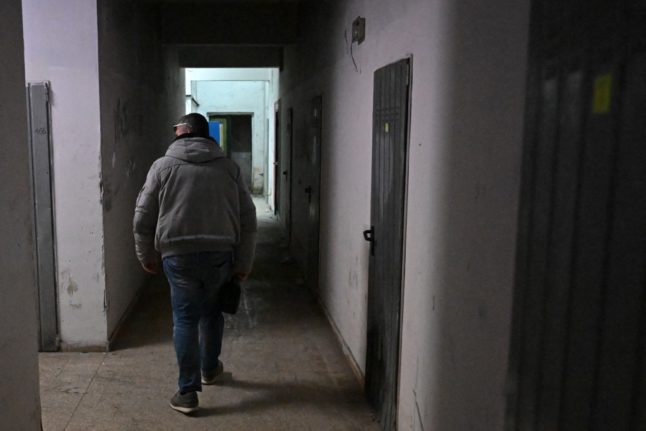
A police detective checks inside a building in Foggia. (Photo by Alberto PIZZOLI / AFP)
In recent years a number of top bosses, including Rocco Moretti and Roberto Sinesi, have been jailed as authorities try to wrest control of the territory from the mafia.
But the upcoming release of one of their rivals, Raffaele Tolonese, and last month's prison escape of Gargano boss Marco Raduano, underscore the challenges.
Interior Minister Matteo Piantedosi visited Foggia in February to seek to reassure locals, pledging to reinforce security, including adding what local authorities say are badly-needed surveillance cameras and street lamps.
Beyond those basics, argued Vaccaro, more police, prosecutors and courts are desperately needed to counter the "climate of fear and intimidation, the cultural and social poverty" in the deprived area.
Only one courthouse serves the entire province, which has a backlog of over 12,000 criminal cases waiting to be tried.
"In this vast territory, either the state has control, or the criminals will take it," said Vaccaro.
By AFP's Alexandria Sage
Comments
See Also
It took a loaded pistol pointed at Lazzaro D'Auria's head for the Italian landowner to finally say yes to the demands of the country's newest and most violent mafia.
The Puglia farmer had resisted their extortion attempts in the past; threats, fires, and damage to his crops and property.
But an early morning visit from a dozen men, including a boss with a gun, forced him to agree to their demand for 150,000 euros a year.
Instead of paying up the next day, D'Auria went to the police, making him one of the few people to ever denounce Foggia's little-known and long-ignored mafia known for its extreme violence.
"If more citizens pressed charges, the local mafia could be weakened," D'Auria, who has lived under police protection since 2017, told AFP.
READ ALSO: ‘We don’t talk much here’: Silence grips Sicilian mafia boss hometown
"Citizens, speak out!" implored the 57-year-old, who sees recent crackdowns by authorities as a sign the mafia can be weakened if locals overcome their fears

Its bloody clan wars were once dismissed as farmers' feuds, but the local mafia operating in the northern part of the Puglia region is finally setting off alarm bells inside the Italian state.
It is sometimes referred to as the ‘Fourth Mafia’ - after Sicily's Cosa Nostra, Calabria's 'Ndrangheta and Naples' Camorra.
But interest in its activities has come late, as Italy's youngest mafia already has a stranglehold over the province.
"It's a rudimentary, primitive mafia. Very violent, very aggressive," said Ludovico Vaccaro, Foggia's public prosecutor.
While the other main mafias have graduated to less visible, more profitable activities, including infiltrating the legitimate economy, the Foggia mafia is still in a nascent phase.
READ ALSO: Messina Denaro: Captured boss’s cousin speaks out against ‘mafia culture’
"Today the mafias have evolved, so they shoot less, seeking a strategy of silence to stay unnoticed," Vaccaro said.
"Whereas this is still a mafia that, to show its power over the territory, shoots and kills."

The ‘Foggia mafia’ is a catch-all label for a syndicate comprising different groups.
The province of Foggia has Italy's third-highest homicide rate, and five of the 16 murders last year were mafia-related.
Family-based ‘battalions’ from different areas often cooperate, dividing extortion money that pays associates and prisoners.
When conflicts sometimes arise over the division of the illicit proceeds, there are quarrels and the battalions clash and start killing each other," said deputy police chief Mario Grassia.
Each group has its speciality, from military-style armed robberies of freight trucks in Cerignola to the old-school tactics used in the city of Foggia, where nighttime bombings of storefronts and cars persuade hesitating shopkeepers to pay up.
Farmers in San Severo like D'Auria often find their olive trees felled, their harvests torched or tractors or livestock stolen.
In Gargano, whose spectacular coast welcomes tourists as well as Albanian drug shipments, the mafia is particularly violent.
The Gargano mafia's grisly calling card, authorities say, is shooting victims in the face, or dumping them in caves.
READ ALSO: PROFILE: Ruthless Sicilian mafia boss Messina Denaro’s reign of terror
"It's easy to hide things. Every once in a while we find something serious, stolen cars, bodies of missing people," prosecutor Vaccaro said.

During a recent drive with police through the city of Foggia, AFP saw countless reminders of the bloodshed that has terrorised the population for decades.
"Right now there's no mafia war, but there's a settling of accounts," said a detective who requested anonymity.
Deputy chief Grassia said he was particularly concerned by three of last year's murders being committed by minors.
"Those participating in these gangs have kinship ties with subjects linked to organised crime," he said.
The newest danger posed by the mafia is infiltrating public institutions. Foggia's city council was dissolved in 2021 due to mafia infiltration and its mayor arrested on corruption charges, one of five local governments in the province dissolved since 2015.

In recent years a number of top bosses, including Rocco Moretti and Roberto Sinesi, have been jailed as authorities try to wrest control of the territory from the mafia.
But the upcoming release of one of their rivals, Raffaele Tolonese, and last month's prison escape of Gargano boss Marco Raduano, underscore the challenges.
Interior Minister Matteo Piantedosi visited Foggia in February to seek to reassure locals, pledging to reinforce security, including adding what local authorities say are badly-needed surveillance cameras and street lamps.
Beyond those basics, argued Vaccaro, more police, prosecutors and courts are desperately needed to counter the "climate of fear and intimidation, the cultural and social poverty" in the deprived area.
Only one courthouse serves the entire province, which has a backlog of over 12,000 criminal cases waiting to be tried.
"In this vast territory, either the state has control, or the criminals will take it," said Vaccaro.
By AFP's Alexandria Sage
Join the conversation in our comments section below. Share your own views and experience and if you have a question or suggestion for our journalists then email us at [email protected].
Please keep comments civil, constructive and on topic – and make sure to read our terms of use before getting involved.
Please log in here to leave a comment.